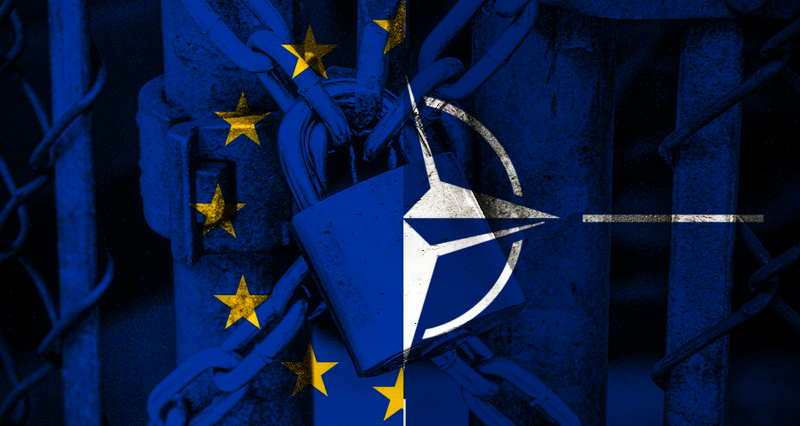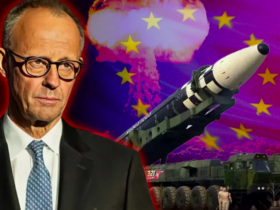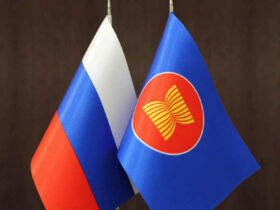NATO, the global control device of the USA, published a joint statement after the EU 5 years. Emphasizing that ‘the transatlantic link is more important than ever’, the statement noted that EU-NATO relations will be taken ‘to the next level’. The Financial Times commented that this move was a blow to Europe’s dreams of strategic autonomy.
The European Union and NATO have issued a joint statement announcing that they will strengthen security cooperation against the growing Chinese and Russian threat. “We are at a key juncture for Euro-Atlantic security and stability, which more than ever demonstrates the importance of the Transatlantic link and requires closer EU-NATO cooperation”, the statement said. The statement became official with the signitures of NATO Secretary General Jens Stoltenberg, President of the European Council Charles Michel and President of the European Commission Ursula von der Leyen.
The level of partnership will be increased
Being the first formulated since 2018, the statement said: “As the security threats and challenges we face evolve in scope and magnitude, we will take our partnership to the next level. NATO remains the foundation of collective defense for its allies and indispensable for Euro-Atlantic security.” Following that, the text emphasized the importance of strengthening and increasing the capabilities of a European army that complements NATO and works in harmony with the Alliance.
In the statement, “increasing geostrategic Fighting “competitiveness”, protecting critical infrastructure, and dealing with threats from new technologies and space are cited as key areas for deeper cooperation.
The United States has long pressed its European allies to spend more on their armies, combat cyber threats, and strengthen the infrastructure needed to quickly relocate forces across the continent.
‘Goodbye European autonomy’
The British Financial Times (FT) underlined that the step taken by the EU and NATO undermines Europe’s orientation of strategic autonomy.
“Goodbye Europe’s strategic autonomy, you left already without knowing you. This is the main takeaway of the EU-NATO joint declaration.” “Facing the biggest war on the continent since 1945, the two organizations [the EU and NATO] have agreed that it is probably safer to rely on Uncle Sam’s F-35s, Patriot missiles and nuclear capabilities,” the newspaper said. included its assessment.
Recalling that before the Ukraine War, “some countries such as France called for Europe to develop more autonomous defense capabilities and to rely less on the United States,” the FT stated that the declaration puts “the reality of today instead.” The newspaper commented that the statement is “a key juncture for Euro-Atlantic security and stability, which more than ever demonstrates the importance of the transatlantic link “.
Cracks can place in jeopardy weapons
Regarding the new Transatlantic line revealed by the paper, the newspaper said, “The EU’s staunch Atlanticists, such as Poland, will be excited by this outcome, which leaves the dreams of those who want less America in the region to smolder like a bombed tank.”
On the other hand, the FT wrote that, as a “disturbing background” to the process was “largely delayed by contention between its three authors”. Stoltenberg, Michel and Von der Leyen. It noted that while they boasted about “closer cooperation”, most of the past year their teams had spent blocking parts of the text and criticizing each other.
“This has no operational significance. Real generals who plan how to defend Europe against attacks do not mind the political strife within Brussels.” The newspaper, on the other hand, argued that the crack in question “could have an impact on long-term issues such as EU defense spending and whether the joint procurement policy will provide the generals with enough or no weapons they will need most in the future”.
A step back on China
Another striking point in the statement was the tone of the attitude towards China. The Financial Times said that “language about China, which is less aggressive than Washington would like, is a minor victory for the more feisty European capitals. China’s growing assertiveness and policies present challenges that we must address,” the statement said.
‘Europe and the Indo-Pacific security is no longer inseparable’
Japanese Prime Minister Kishida Fumio said that the security of Europe and the Indo-Pacific are no longer separable. Speaking in a joint press release before their meeting with French President Macron at the Elysee Palace, Kishida said: “The security of Europe and the Indo-Pacific are now inseparable.” said. He noted that they want to maintain coordination with France in the context of increasing attempts to change the status quo in the South China Sea and East China Sea. Kishida underlined that this coordination goes through areas such as joint exercises. Expressing his satisfaction with the progress of coordination between the two countries in sectors such as automobile, civil aviation, sustainable energy and nuclear, Kisida emphasized that France is the primary partner to enable a free and open Indo-Pacific region.
US preparations to deploy soldiers to Sweden
The United States and Sweden have started negotiations on a new security agreement that will regulate future deployment of US troops in the Scandinavian country, which is applying for NATO membership.
The Swedish Ministry of Defense said in a statement the previous day that officials are currently working on the details of a Defense Cooperation Agreement (DCA), which they see as “a natural development of the long-term cooperation between Sweden and the United States in the field of security and defense.”
“The United States is Sweden’s most important security and defense policy partner, both bilaterally and within NATO. Our security is strengthened by creating the conditions for an American presence in Sweden, including the exercises.” it was said.
The deal will reportedly cover “adjusting the legal conditions for the presence of American forces in Sweden”, as well as “access to base areas, pre-storage of supplies” and other issues related to future deployment of US troops.
















Leave a Reply